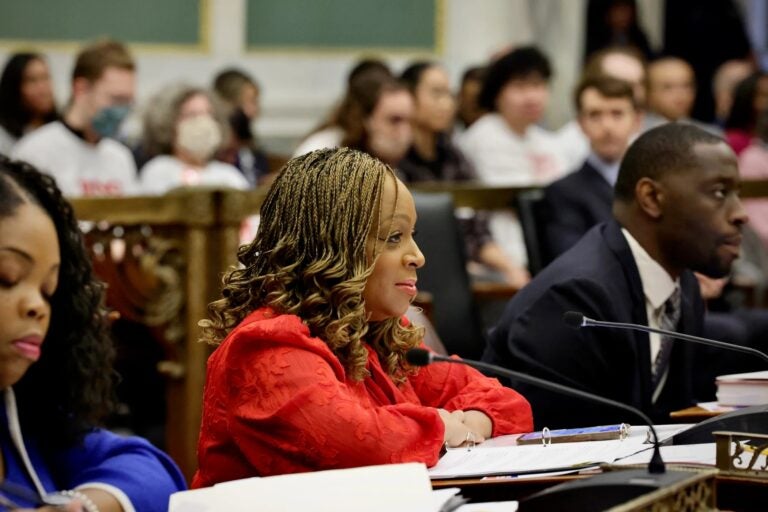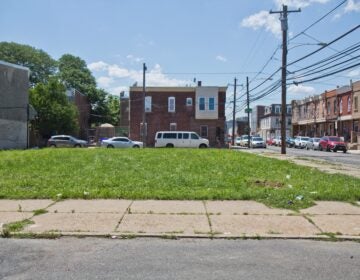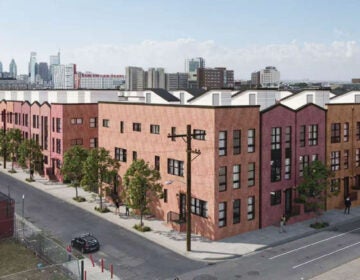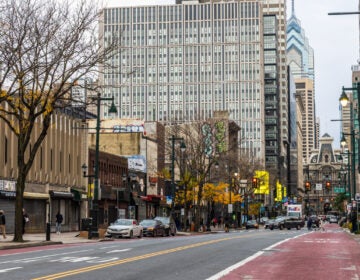Philly charter change proposal would mean more funding for affordable housing
The measure looks to close a loophole that has frustrated housing advocates for years.
Listen 0:54
Philadelphia City Councilmember Jamie Gauthier introduced a bill designed to increase the city’s supply of affordable housing. (Emma Lee/WHYY)
Have a question about Philly’s neighborhoods or the systems that shape them? PlanPhilly reporters want to hear from you! Ask us a question or send us a story idea you think we should cover.
A City Council committee has approved a bill designed to increase the city’s supply of affordable housing, moving the measure one step closer to becoming law amid opposition from Mayor Cherelle Parker’s administration.
Introduced in February, the bill proposes a charter change to ensure that 100% of the “payments in lieu of providing affordable housing” developers make through the city’s Mixed-Income Housing Bonus Program go to the Housing Trust Fund, which is used to create and preserve affordable homes.
Between 2019 and 2023, the program generated more than $43 million intended for the trust fund, according to the city. But only a portion of that total has made it there. The rest went directly to the general fund.
“Not once since this payment-in-lieu option began have these density bonuses led to a proportionate increase in the Housing Trust Fund. This contributes to affordable housing citywide being underfunded,” said Councilmember Jamie Gauthier, who introduced the bill, during Monday’s hearing.
The bill moves forward as the city continues to experience an affordable housing crisis marked by a limited supply of affordable units for people with low incomes. Thousands of residents are also cost-burdened, meaning more than a third of their income is used to pay for housing.
Gauthier’s measure is part of her “Defying Displacement” campaign. The effort primarily aids Black and brown residents with low incomes, including constituents in her 3rd District, which includes swiftly gentrifying sections of West Philadelphia such as University City.
Launched in 2018, the mixed-income program enables developers to increase the density of their projects beyond the base zoning — whether that means more units or floor area — by either building price-restricted affordable housing or paying the city. If they opt to make a payment “in lieu” of creating the affordable units, that money is supposed to go toward housing programs funded through the Housing Trust Fund. But nothing is binding about the arrangement, meaning the money can be used elsewhere.
The charter change, which requires voters to approve a ballot question, would effectively close that loophole, a move backers say does little more than satisfy the original intent of the mixed-income program.
If passed, density bonus payments would also have to be spent in specific parts of the city, particularly areas where increased development threatens to displace residents with low incomes. The measure would also lower the income threshold for residents benefitting from Housing Trust Fund dollars.
“We are not against development. But we need tools to carve out housing opportunities for this very vulnerable population that’s just not in East Parkside but it’s around the city of Philadelphia. We really need forward-thinking solutions and policies to soften the imbalance of these housing inequities,” said Joyce Smith, a board member with Centennial Parkside CDC. The full Council must pass the bill before a ballot question is put to voters. The bill is eligible for final passage as early as next Thursday. It would appear on the ballot next May.
The Parker administration is against the measure because it would “bind the hands” of any mayor, especially during budget negotiations by creating another fixed cost like the city’s pension obligations, said Finance Director Rob Dubow.
“We agree that housing funding is essential but so are other portions of the budget like education funding,” said Dubow.
The administration projects the proposed charter change would cost the city’s general fund around $5 million annually and up to $25 million over five years.
The funding would be in addition to the millions the city is already required to send to the Housing Trust Fund under a separate charter change. Enacted in 2021, the measure requires at least 1.5% of the city’s annual general fund appropriations to go to the fund.

Subscribe to PlanPhilly
WHYY is your source for fact-based, in-depth journalism and information. As a nonprofit organization, we rely on financial support from readers like you. Please give today.









